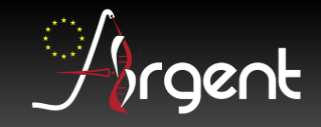Advanced Radiotherapy, Generated by Exploiting Nanoprocesses and Technologies (ARGENT)

Horizon 2020 Project ID: 608163 Funded under the Marie Curie FP7-PEOPLE scheme as a MC-ITN - Networks for Initial Training (ITN).
Cancer is the second most common form of death in Europe after cardiovascular disease. In 2006, 3.1 million new cases were diagnosed and 1.7 million deaths were attributed to cancer within Europe. Around 50% of patients receive radiotherapy as part of their cancer treatment and it is second only to surgery in its ability to cure cancer. However while radiotherapy is effective in treating tumours radiation induced effects are also induced in the surrounding healthy tissues. New approaches that enhance radiosensitivity within a tumour but mitigate the effect on healthy tissue therefore have the potential to provide a major impact on the delivery of radiotherapy to patients. Two of the most promising new approaches (hadron and nanoparticles-enhanced therapies) are driven by nanoscale phenomena. T
ARGENT brings together world-leading researchers from the academic and private sectors with the aim at developing hadron and NP-enhanced therapies, united by the common purpose of optimising radiotherapy by understanding and exploiting nanoscale processes induced by radiation. Such an understanding will open a new era in which radiotherapy is revolutionised to provide more successful cancer treatments with subsequent economic and ‘quality of life’ benefits for the EU population as a whole.
The main objective of this intersectoral and multidisciplinary ITN is to create a new generation of researchers and experts able to create the platform on which next-generation cancer therapy will be built. In particular the ARGENT consortium aims to train a cohort of 13 ESRs, drawn from across the globe, in radiotherapy, nanotechnology and underpinning molecular sciences with the aim of these ESRs subsequently acting as leaders and ambassadors in the new field of nanoscale cancer therapy.
The Open University hosts three ARGENT ESRs; Sophie Grellet is dedicated to experimental studies exploring the role of Au nanoparticles as a radiosensitzer in cancer cells. Kaspar Haume is developing computer simulations of the interaction between nanoparticles, radiation, and biological matter to get a better understanding of nanoscale processes in the cell induced by secondary electrons emitted from nanoparticles by ionizing radiation. Pablo de Vera is developing a theoretical study of physical phenomena involved in ion beam irradiation of biological systems including thestudy of shock wave phenomena.
For more details on the ARGENT project and its results see the website http://itn-argent.eu/ and download the Newsletters http://itn-argent.eu/newsletters.
Contact;
Valeria Martin Project Manager
Phone: +33 1 69 15 78 70
Institut des Sciences Moléculaires d’Orsay (ISMO), CNRS
Univ Paris Sud, build 351, office 020, 91405 Orsay cedex, France
Professor Sandrine Lacombe, Project Coordinator
Phone: +33 1 69 15 76 96
Institut des Sciences Moléculaires d’Orsay (ISMO)
Univ of Paris Sud, Univ Paris Saclay, CNRS, build 351, Orsay cedex, France
This project has received funding from the European Union’s Framework 7 FP7-PEOPLE programme under the Marie Skłodowska-Curie grant agreement No 608163.
Meet our Academics

In addition to teaching on Open University modules our academics are engaged in ground breaking research that benefits individuals and society.
Request your prospectus
Explore our qualifications and courses by requesting one of our prospectuses today.
Request prospectusAre you already an OU student?
Upcoming Events
Black STEM Hub: How to improve your grades with the library!
Thursday, March 5, 2026 - 18:15 to 19:30
Teams Webinar